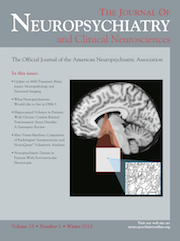To the Editor: It has been reported that dengue is known as the most frequent human arboviral infection in the world, with 50 million cases per year and 2.5-to-3 million people at risk of contamination, estimated by OMS.
1 Co-circulation of the four types of dengue viruses and expansion of the dengue epidemic gave rise to infection enhancement and a big expansion of clinical aspects of the disease.
2 Among these clinical aspects, a small percentage of people who develop dengue develop neuropsychiatric complications (encephalitis, seizures, meningoencephalitis, encephalopathy, personality disorder, and altered level of consciousness) during and after the disease.
3 We report on a case of 12-year-old young boy, attending sixth grade, with a history of dengue presenting neuropsychiatric manifestations. The patient was admitted to Palmas General Hospital complaining of severe headache for 10 days, with progressive worsening, fever, vomiting, seizures, and difficulty in walking. The initial medical examination showed temperature of 40°C, heart rate of 88 beats per minute and blood pressure of 100×68 mmHg. Pulmonary and cardiac examination showed no alterations; no signs of meningeal involvement. According to the patient´s parents, there was behavior change in the last 15 days, characterized by emotional lability, dependence, alteration in the rhythm of language and tone voice, anxiety, and change in tastes. Laboratory tests were ordered, including serology for dengue and herpes virus, as well as imaging tests (magnetic resonance imaging and computed tomography). The magnetic resonance and computed tomography showed no changes in the brain, and the studies of cerebrospinal fluid revealed high protein levels and increased lymphocytes. After 5 days of hospitalization, the serology for dengue came back positive for both IgM and IgG immunological markers. The patient received risperidone 1mg per day, and behavioral symptoms improved after 10 days. He was discharged after 21 days of hospitalization, but, 60 days later, behavioral symptoms were still presented. In this case, the neuropsychiatric complication, although rare, can be explain by the knowledge of some isolated or associated events, such as cerebral edema, cerebral hemorrhage, hyponatremia, acute liver failure, or cerebral anoxia, among others.
4 Infection of the nervous system by dengue virus can be partially understood by knowledge of the three hypotheses of systemic viral infection: the sequential infection theory, developed by Halsted
5; the hyper-endemicity theory, by Rosen;
6 and the occurrence of genetic recombination resulting from simultaneous infections by different serotypes.
6 The rarity of this case, along with the still unknown field of the systemic repercussions of dengue infection, make this report important for further studies.

